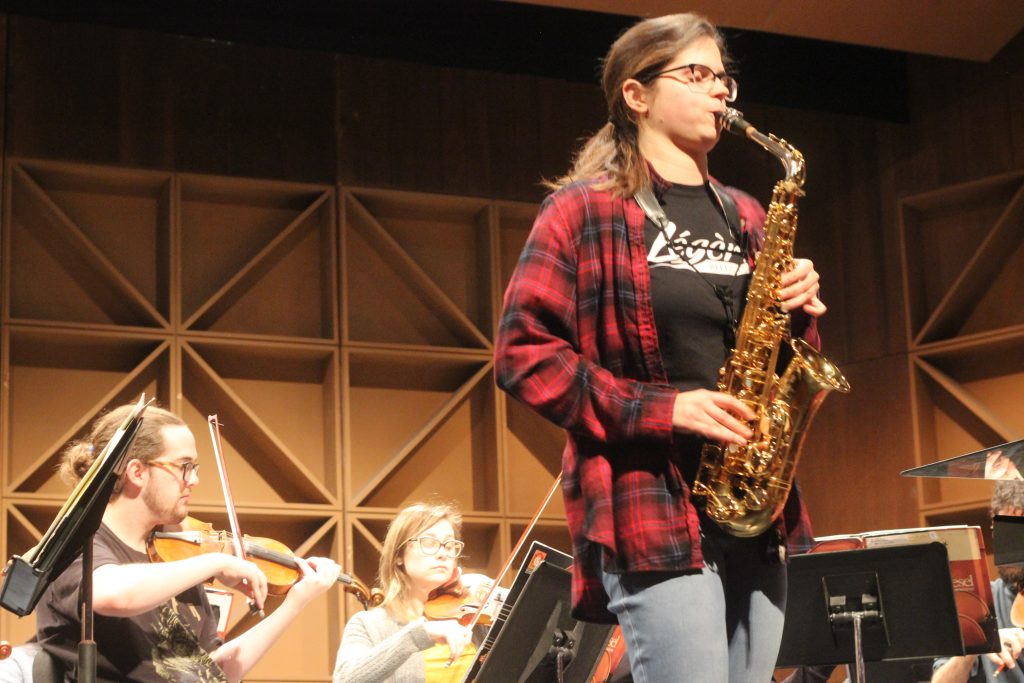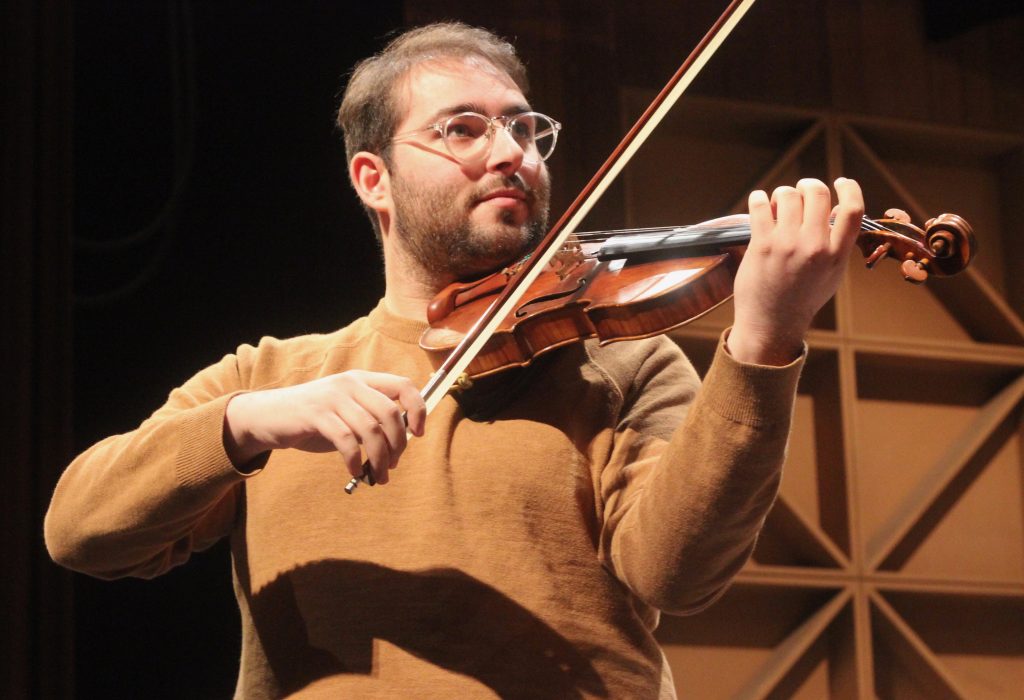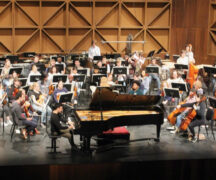By DAVID DUPONT
BG Independent News
Lindsey Welp loves the saxophone.
The saxophonist started playing the instrument in middle school. “I loved it from the moment I started,” Welp said. “I couldn’t stop thinking about it. So I just decided to keep going and now I’m here.”
The here is Bowling Green State University’s College of Musical Arts.
On Saturday, Feb. 22, at 8 p.m. she will perform with the Bowling Green Philharmonia in Kobacker Hall as one of the four winners in the college’s Competitions in Music.

The competition was held in December. The four winners, two graduate and two undergraduate, will perform. The performers are: Welp, graduate division; Thomas Roggio, violin, graduate; Taylor Francis, flute, undergraduate; and Cole Habekost, violin, undergraduate.
“I love the saxophone because it can play jazz and classical and there’s a bunch of things in between it can do,” Welp said. “It has the most beautiful sound, and it looks beautiful.”
Welp followed her love of the instrument to Bowling Green. In high school she started studying with Scotty Stepp, a teacher at DePauw University. She traveled three hours each week for lessons, and she enjoyed them so much, she wanted to continue, so she attended DePauw for her bachelor’s degree.
Then she decided she wanted to study with Stepp’s former teacher John Sampen at BGSU.
She was attracted also by the school’s strong reputation as a center for new music. “There definitely it is just a lot of great opportunities here,” she said.
That includes the concerto competition. “The saxophone does not play in an orchestra so I have not been able to play with strings in orchestral setting,” Welp said.
She said she loves playing Pierre Max Dubois’s 1959 Concerto for Alto Saxophone and String Orchestra “because it has such a beautiful sonority with the strings.”

Roggio said he was drawn to Maurice Ravel’s “Tzigane, rapsodie de concert pour violon and orchestre” from 1924.
The title means “gypsy” in Hungarian, he said. “It has the jagged edge but is really sweet. When I first listened to this piece it was terrifying.”
The piece was made pyrotechnical demands on the soloist. Yet, he said, “I love the lyricism and the power when you took all that technique away. The piece really tells a story. You start with a solo violin cadenza, and it builds this wonderful orchestral tutti and then you all push forward to the end.”
He added: “If I’m honest it’s something I never thought I’d have the opportunity to do.”
Roggio, who comes from Long Island, New York, began playing violin in fourth grade. “There’s just something really warm about the sound, something where the bow starts on the string and it immediately captivated me.”
In eighth grade, his teacher complemented his playing and asked if he had considered pursuing it as a career.
“At first I was really hesitant because I’m the first and only musician in my family,” Roggio said.
He’d grown up participating in theater. “I just loved the idea of performing and being on stage…. This was just my way to be on stage and enjoy the rush of giving a performance.”
After his undergraduate work at SUNY Fredonia in Western New York, he came to BGSU to study with “my amazing teacher” Caroline Chin.
He received an assistantship to play in the Graduate String Quartet. “They just give us so many great performance opportunities that it was hard to turn it down.”
He also serves as concertmaster in the Philharmonia. Stepping away from his usual role and standing in front of his colleagues “makes the collaborative process really interesting.”
He also praised the assistance provided by the graduate student conductors who lead the orchestra for the concert.
Alex Popovici conducts the orchestra for the Ravel. Also conducting are MK Raplinger, Isaac Page, and David Brax as well as guest conductor Nathaniel Parker.

Habekost said performing Erich Wolfgang Korngold’s Concerto for Violin in D major (1937/1945) is “a little nerve wracking at times because you’re playing your part in front of all of your friends. But it’s exhilarating too. It’s really fun to get to work with them and make something unique and special.”
Habekost, from Toledo, started playing violin in first grade at Maumee Country Day School “because my friends were playing instruments and I wanted to hang out with my friends more.”
But, he said, “at first it’s hard to want to practice the violin because you sound so bad. So I had my parents pushing me. Then it’s become such a part of my life that it’s almost like breathing. I feel I have so much to say musically. That’s what drives me. I just enjoy making music more than anything else.”
In his junior year, he decided to pursue music as a career. “What it came down was I decided I wanted to be able to do what I love, and what I love to do most is music. So if it’s possible get a career in it, if I’m fortunate enough, I’ll chase it.”
He came to BGSU, where he had participated in the summer string camp, both to study with Chin and because of the school’s new music scene. Since being here, he’s been able to collaborate with student composers and perform during the annual New Music Festival as well as a soloist with the Philharmonia.
“This concerto has always spoken to me on some level because it’s so optimistic and colorful,” he said of the Korngold work. Korngold is most famous for his work composing Hollywood movie scores, winning two Oscars. “I love the colors,” Francis said. “It almost sounds like the soundtrack to ‘Star Trek.’ It sounds like a movie soundtrack.”
Francis, a senior, decided to perform Carl Nielsen’s “Concerto for Flute” from 1926 as a challenge. “It’s a weird piece. There are no transitions. It’s easy for this piece to fall flat. I thought of it as a challenge to make something of this strange music and bring out all these different characters and do the most with what’s here.”
Francis’ musical journey started in fifth grade in Dallas at the instrument petting zoo. He wanted to play clarinet but could only get a squeak out. He failed the percussion test. His hands were too small for other instruments.
There was flute. “I liked it as soon as I started.”
When it came time to apply to college, he applied to top conservatories, but BGSU “was what worked out the best.”
He was excited by the prospect of studying with Conor Nelson, whom he’d heard at Texas Flute Symposium. Francis was impressed by “how different and exciting his teaching is. It’s inspiring and exciting and how could you not want to be part of that?”
Every lesson with Nelson is different and exciting.
He’s enjoyed his time at Bowling Green more than he expected, not just the school, his fellow students, and professors, but Bowling Green itself. “The community is so fun,” he said. “Bowling Green is a happening place for people in the arts.”
Francis said he played the Nielsen concerto in the competition last year and made the finals.
In the last year, he said, his lessons have taken on a new focus. “It’s not as much about playing the flute as giving the audience an experience, something they can enjoy. It’s not about me anymore. It’s about music that I have to share.”


